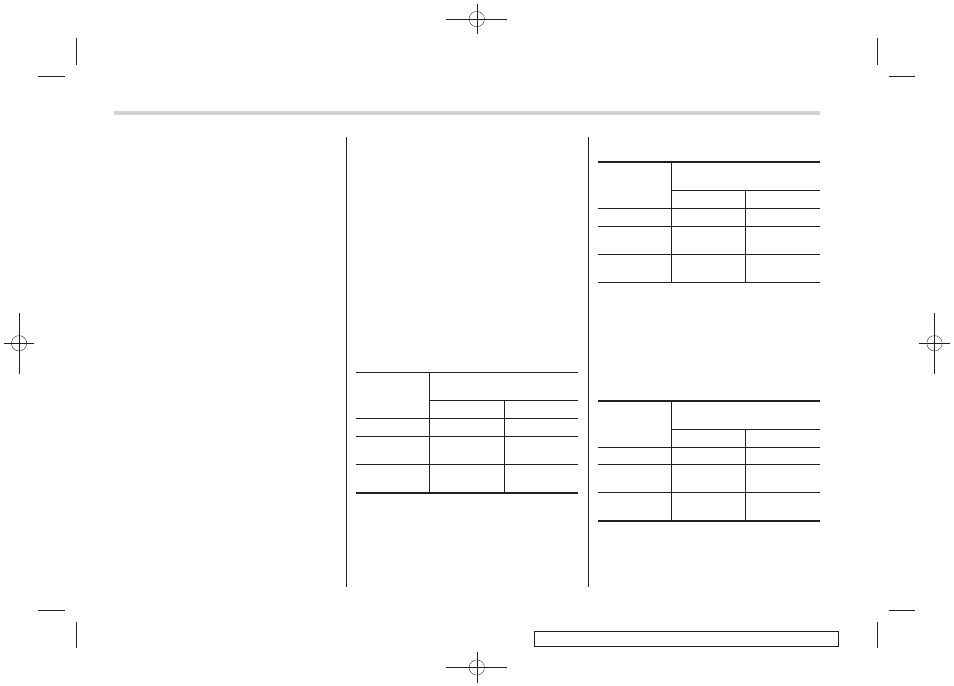Subaru 2009 Legacy User Manual
Page 384

Black plate (394,1)
北米Model "A2450BE-A" EDITED: 2008/ 3/ 24
11-34
Maintenance and service
or icy roads, we strongly recommend the
use of winter (snow) tires.
When installing winter tires, be sure to
replace all four tires.
! Winter (snow) tires
Winter tires are best suited for driving on
snow-covered and icy roads. However
winter tires do not perform as well as
summer tires and all season tires on roads
other than snow-covered and icy roads.
& Tire pressure monitoring
system (TPMS) (if equipped)
The tire pressure monitoring system pro-
vides the driver with a warning message
by sending a signal from a sensor that is
installed in each wheel when tire pressure
is severely low. The tire pressure monitor-
ing system will activate only when the
vehicle is driven. Also, this system may
not react immediately to a sudden drop in
tire pressure (for example, a blow-out
caused by running over a sharp object).
If you adjust the tire pressures in a warm
garage and will then drive the vehicle in
cold outside air, the resulting drop in tire
pressures may cause the low tire pressure
warning light to illuminate. To avoid this
problem when adjusting the tire pressures
in a warm garage, inflate the tires to
pressures higher than those shown on the
tire placard. Specifically, inflate them by an
extra 1 psi (6.9 kPa, 0.07 kgf/cm
2
) for
every difference of 10
8F (5.68C) between
the temperature in the garage and the
temperature outside. By way of example,
the following table shows the required tire
pressures that correspond to various out-
side temperatures when the temperature
in the garage is 60
8F (15.68C).
Example:
Tire size: P225/55R17 95V, P225/60R16
97H
Standard tire pressures:
Front: 32 psi (220 kPa, 2.2 kgf/cm
2
)
Rear: 30 psi (210 kPa, 2.1 kgf/cm
2
)
Garage temperature: 60
8F (15.68C)
Outside
temperature
Adjusted pressure
[psi (kPa, kgf/cm
2
)]
front
rear
30
8F (−18C)
35 (240, 2.4)
33 (230, 2.3)
10
8F (−128C)
37
(255, 2.55)
35
(240, 2.4)
−108F
(
−238C)
39 (270, 2.7)
37 (255, 2.55)
Example:
Tire size: 215/45R17 91W
Standard tire pressures:
Front: 35 psi (240 kPa, 2.4 kgf/cm
2
)
Rear: 33 psi (230 kPa, 2.3 kgf/cm
2
)
Garage temperature: 60
8F (15.68C)
Outside
temperature
Adjusted pressure
[psi (kPa, kgf/cm
2
)]
front
rear
30
8F (−18C) 38 (265, 2.65) 36 (250, 2.5)
10
8F (−128C)
40
(280, 2.8)
38
(265, 2.65)
−108F
(
−238C)
42 (295, 2.95)
40 (280, 2.8)
Example:
Tire size: 215/45R18 89Y, P215/45R18
89W, P205/50R17 88V
Standard tire pressures:
Front: 33 psi (230 kPa, 2.3 kgf/cm
2
)
Rear: 32 psi (220 kPa, 2.2 kgf/cm
2
)
Garage temperature: 60
8F (15.68C)
Outside
temperature
Adjusted pressure
[psi (kPa, kgf/cm
2
)]
front
rear
30
8F (−18C)
36 (250, 2.5)
35 (240, 2.4)
10
8F (−128C)
38
(265, 2.65)
37
(255, 2.55)
−108F
(
−238C)
40 (280, 2.8)
39 (270, 2.7)
If the low tire pressure warning light
illuminates when you drive the vehicle in
cold outside air after adjusting the tire